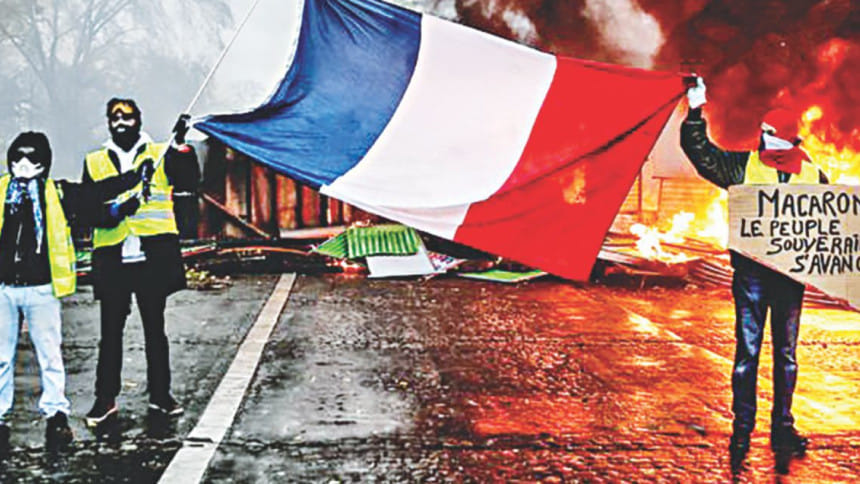Return of French revolutionary zeal

France is famous for the French Revolution of 1789, which overthrew the monarchy. It has a long history of protest movements which flare every now and then, opposing everything from reforming labour laws to gay marriage.
The recent violent protests by the "yellow vests" (gilet jaunes) movement actually threatened the government of President Emmanuel Macron. This organic leaderless movement with no clear ideology grew via social media and has supporters from across the political spectrum. Seeing the demonstrators rage and the extent of destruction of public property, some bloggers called it the French Spring. The massive street violence that took place in France in 1968 is still vivid in memory.
As part of his Social Contract for the 21st century, President Macron unveiled his 10-year energy transition plan on November 11, 2018. The plan imposes a green tax on fuel which was supposed to come into effect from January 1, 2019. The announcement immediately raised hackles among the middle- and lower-income groups. And since November 17, tens of thousands of protestors wearing yellow vests converged to Paris to demonstrate against the government move. In traditional French culture yellow represents the Mediterranean regions of France which always felt oppressed by Paris. The vest represents lack of arms—that is helplessness in French psyche.
At first the protestors sang La Marseillaise (national anthem), chanted "Macron resign" slogans and littered the walls with imaginative graffiti—one such saying "the state is killing me". But soon the demonstrations degenerated into violence—burning cars, smashing priceless statues and vandalising monuments, looting boutiques in Champs Elysees. The anarchy left three people dead in accidents, 400 arrested, over 200 wounded in clashes with police at a time when President Macron was attending the G20 summit in Buenos Aires. The situation grew so critical that Macron hurried back to Paris on December 2, and went into emergency meetings with his cabinet and contemplated declaring a state of emergency.
After the meeting at Elysée Palace on December 4, Prime Minister Edouard Philippe declared that the government was suspending the fuel tax for the next six months. The price of gas and electricity will also remain frozen and is supposed to bring relief for the lower income groups as winter is approaching. Philippe said, "No tax is worth jeopardising the unity of the nation". People's anger must be heard and the measures would not be applied until there had been proper debate with those affected.
While the PM tried to defuse tension, the yellow vest demonstrators refused to back down. The protestors say that six months later the plan will come back which is not acceptable. It is not only an anti-tax movement as several other economic and social malaise have been tagged with it. The movement has gathered support from people across the nation who are financially less fortunate.
Stepping back from the plan is a setback for Emmanuel Macron (39) and his centre-right "En Marche" movement. Since becoming president in May 2017 his popularity has been continuously sliding because of his wide-ranging yet controversial reform plans for a green economy.
Macron's environmental transition plan has come under serious criticism by experts and opposition political parties as it lacks clarity. The tax is not uniform for the industries and individual citizens. The discriminatory transition plan requires all citizens to pay higher fuel prices, but exempts big companies—airlines, shipping, major industries, etc. Vested interest groups apparently blocked the rise in fuel prices in major businesses. Macron is accused of supporting the business conglomerates.
The plan is condemned as it will hurt the middle and lower income groups directly at a time when income inequality in French society is on the rise. The middle- and lower-income groups in provincial France extensively use vehicles for their day-to-day lives and businesses. The tax will tear off a substantial portion of their wage package. Critics say that Macron's carbon tax fiscal policy will help balance his deficit budget—but do no good to the environment.
Experts say that the environmental transition plan requires addressing issues of social and environmental progress simultaneously. All would be much better off living in an environmentally friendly society. For that to happen France shall have to protect everyone in their financial and economic needs to make them socially secure. For instance, workers laid-off from shut-down coal-fired power plants should get secure jobs elsewhere.
Meanwhile the blame game is on between the government and the opposition parties. French Interior Minister Christophe Castaner denounced ultra-right National Rally leader Marine Le Pen for encouraging the demonstrators through Twitter. Another report says former President Francois Hollande encouraged the yellow vest activists to "continue to engage in dialogue" with the government when they came to see him. Centre-right Republicans and far-left opposition parties have also publicly backed the movement.
With his popularity hovering below 30 percent, President Macron is in a delicate balancing act—to push his reform package and meet the demands of protestors. If he gives in it may be the end of his reform attempt for the rest of his tenure in Elysée Palace. That would be a major political cost for Macron.
The yellow vest protestors have nominated an eight-person delegation to talk to the government. The movement will be waiting to hear from Macron on what he intends to do next. However, after three weeks of demonstrations the movement may peter off for now as Christmas comes up and winter sets in. But it is clear that the French seem to have a tremendous appetite for revolution. They will oppose any government programme that hurts the lower income groups.
Interestingly, France is not the only European nation in crisis. Across the English Channel the Conservative government of Theresa May is also in deep soup with her Brexit Deal.
Mahmood Hasan is a former ambassador and secretary of the Bangladesh government.





Comments